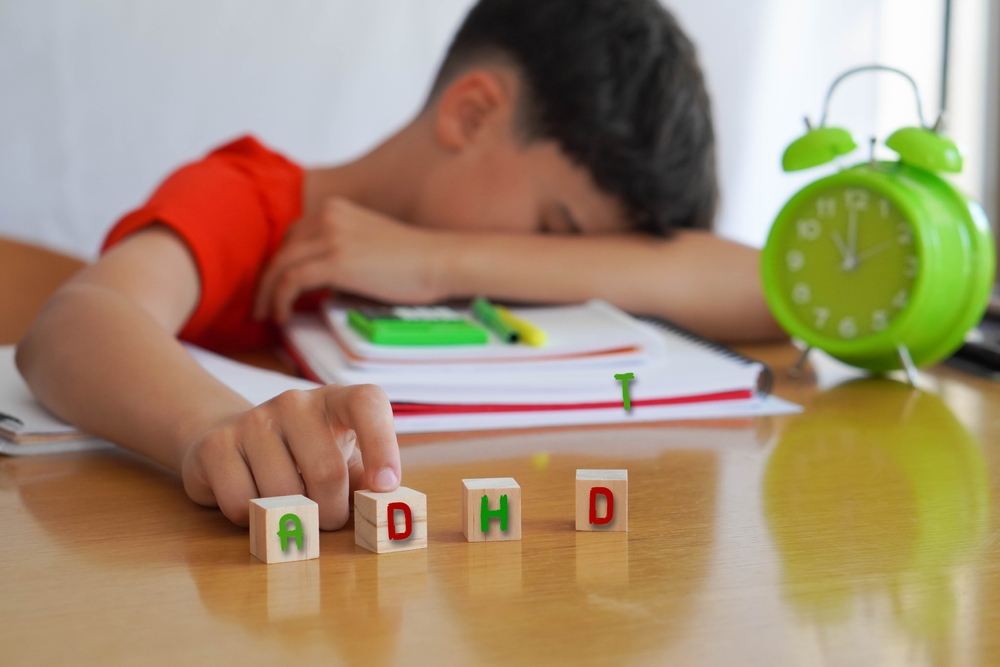Let’s look at the lifestyle factors and disorders that can cause short attention spans.
Why You Might Have a Short Attention Span
There is ongoing debate about whether short attention spans are worsening, particularly due to the influence of technology, but the reality is that people’s attention spans vary for a variety of reasons.
The most common reasons for having a short attention span include:
- The influence of technology and modern life
- Sleep problems
- Stress and anxiety
- Mental health conditions and disorders
In today’s fast-paced world, attention spans are shrinking, and although many criticise Gen Z, the cause of our attention issues will affect many different generations, especially those to come, as the constant hustle and bustle makes focus difficult for everyone.
Technology plays a significant role; frequent use of smartphones, social media, and constant notifications train the brain to seek quick rewards, leading to easy distractions, and certain notification tones train us, just like Pavlov’s dog, to switch our focus.
Multitasking is also prevalent, causing decreased focus as the brain switches between tasks, reducing the ability to concentrate deeply. Furthermore, cognitive overload, due to an overwhelming amount of information, adds to this, making it challenging to process and retain details effectively.
People who have issues sleeping or face general fatigue due to mental or physical exhaustion also face poorer cognitive performance and a reduced ability to focus.
Plus, high levels of stress or anxiety can affect cognitive functions and make it difficult to concentrate. While conditions such as ADHD (Attention-Deficit/Hyperactivity Disorder), among many others, can contribute to shorter attention spans.
Unfortunately, each of these factors can have a large influence on the other so it can be difficult to get to the root of the problem of someone’s short attention span. However, this also means that addressing some of the issues will help improve attention spans.
Technology Use

Technology, especially through frequent notifications and social media, has significantly impacted our attention spans. Modern digital devices are designed to capture our attention with a constant stream of alerts, messages, and updates.
Each notification triggers a small burst of dopamine, reinforcing the behaviour of frequently checking our devices. This constant interruption creates a cycle of distraction, making it difficult to focus on any single task for extended periods.
Social media platforms exacerbate this issue with their emphasis on short, engaging content. The popularity of 15-second clips and quick, visually stimulating posts, across popular sites like TikTok and Instagram caters to – and encourages – our shrinking attention spans, as these formats are designed to deliver instant gratification and immediate engagement. While these quick hits can be entertaining, they condition users to expect rapid rewards and can undermine the ability to concentrate on longer, more complex tasks.
The cumulative effect of these constant interruptions and brief content formats is a reduced capacity for sustained focus. Our brains become accustomed to frequent shifts in attention, leading to difficulty in maintaining concentration on tasks that require prolonged engagement. This shift in attention patterns can impact productivity, learning, and overall cognitive function.
To counteract this, individuals might need to actively manage their technology use, set boundaries for device interactions, and engage in activities that promote deeper focus and longer attention spans.
Fatigue
Poor sleep and mental and physical fatigue can significantly impair our attention spans and cognitive functions. When we don’t get enough quality sleep, our brain struggles to process and consolidate information, affecting our ability to focus and concentrate.
Sleep is crucial for cognitive processes such as memory, learning, and problem-solving. Without sufficient rest, our cognitive resources are depleted, making it harder to stay attentive and engaged with tasks.
Fatigue also impacts attention by reducing mental energy and motivation; when we’re tired, our cognitive functions slow down, and our ability to filter out distractions diminishes. This leads to shorter bursts of focus and more frequent lapses in attention. Tasks that require sustained mental effort become more challenging, and our reaction times can be slower.
Additionally, chronic fatigue can contribute to mood swings and irritability, which further disrupt attention and productivity. To maintain optimal attention spans, it’s essential to prioritise good sleep hygiene, including consistent sleep schedules, a conducive sleep environment, and effective stress management. Addressing sleep issues and managing fatigue can help improve concentration and overall cognitive performance.
Mental Health Conditions and Disorders
Mental health conditions can significantly impact our ability to focus and often lead to short attention spans. Various conditions can cause difficulties with maintaining concentration, leading to frequent distractions and interruptions.
For instance, heightened anxiety and stress may result in racing thoughts and excessive worry, making it challenging to focus on single tasks. This heightened mental alertness can impair both focus and memory. Similarly, depression can reduce motivation and mental energy, further diminishing concentration.
Additionally, mood disorders can cause fluctuating attention levels, with periods of heightened distractibility or decreased focus depending on mood states.
Overall, such conditions disrupt cognitive processes, affecting our ability to stay engaged and manage tasks effectively. Addressing these issues through therapy, medication, and coping strategies can help improve attention spans and overall cognitive functioning, but seeing a professional for personalised advice is essential when treating these disorders.
What Disorders Cause a Short Attention Span?

Several mental health disorders can cause short attention spans, affecting life at school, home, and the workplace.
Here’s a brief look at some key disorders, including:
- ADHD (Attention-Deficit/Hyperactivity Disorder)
- Anxiety Disorders
- PTSD (Post-Traumatic Stress Disorder)
- BPD (Borderline Personality Disorder)
- Bipolar Disorder
ADHD is marked by ongoing patterns of inattention and hyperactivity-impulsivity, making it difficult for individuals to focus, complete tasks, and stay organised.
Anxiety disorders, such as Generalised Anxiety Disorder (GAD), can cause racing thoughts and mental alertness, impairing concentration, academic performance, and the ability to manage daily tasks.
PTSD can involve flashbacks, intrusive thoughts, and heightened alertness, often disrupting focus, especially in high-stress or triggering environments.
Borderline Personality Disorder (BPD), sometimes known as Emotionally Unstable Personality Disorder (EUPD), is characterised by intense emotional instability and fluctuating attention due to emotional turmoil, which can complicate task completion and relationships.
Bipolar disorder involves mood swings between manic and depressive states, affecting motivation and causing a lack of focus.
These conditions impact attention spans differently, affecting productivity, task management, and interpersonal relationships. Personalised treatment and support can help improve attention and overall quality of life for individuals facing these challenges.
Strategies for Improving Your Short Attention Span

Improving your attention span involves adopting strategies that enhance focus and reduce distractions. Here are some effective strategies and how to implement them:
- Break tasks into smaller, manageable goals. This makes tasks less overwhelming and easier to focus on. Create to-do lists or use task management apps to stay organised.
- Focus on high-priority tasks first. The Eisenhower Matrix can help you categorise tasks by urgency and importance, guiding your attention to what truly matters.
- Create a dedicated workspace and reduce interruptions. Turn off non-essential notifications and use apps that block distracting websites during work sessions.
- Practice mindfulness and meditation to train your brain to stay present. Even a few minutes of daily practice can improve your concentration over time.
- Use techniques like the Pomodoro Technique, to ensure you take regular breaks to prevent burnout and maintain focus.
- Ensure adequate sleep, regular exercise, and a balanced diet, as physical well-being significantly impacts cognitive function and attention.
To learn and implement these strategies, start with one or two at a time. Set specific goals and make sure to track your progress. Adjust as needed and gradually integrate more techniques into your routine.
Consistency is key to making these practices effective in your daily life.
Managing ADHD

Managing ADHD effectively requires a comprehensive approach that integrates strategies across various aspects of life.
To improve attention spans, structured routines and environmental adjustments, like breaking tasks into smaller parts and using planners or digital reminders, are beneficial. For studying or working, creating distraction-free environments and taking regular breaks can enhance productivity.
Parenting children with ADHD involves establishing consistent routines, applying positive reinforcement, and collaborating with educators.
Diet also plays a role; a balanced diet rich in fruits, vegetables, and lean proteins supports cognitive function, while reducing sugar, processed foods and caffeine may help stabilise mood and energy.
Consistently applying these strategies can lead to significant improvements in managing ADHD symptoms.
The Brain Workshop Can Help!
For help managing your ADHD, contact the Brain Workshop!






